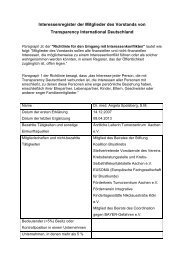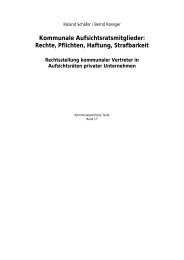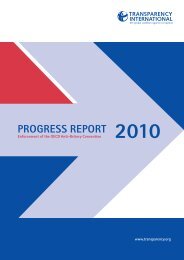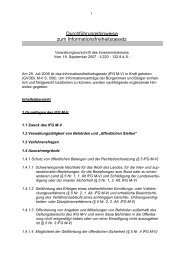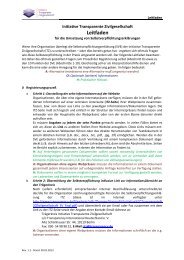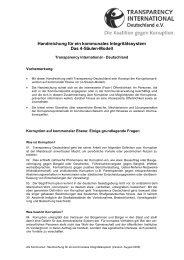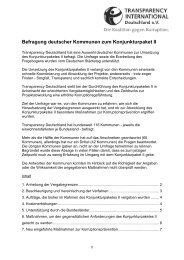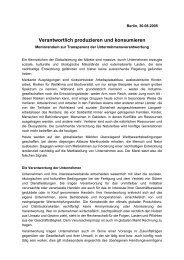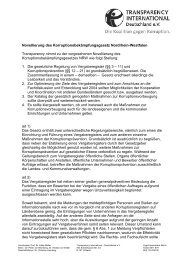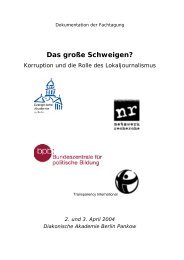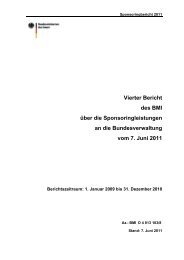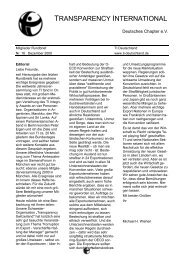Transparency International Germany - European Commission
Transparency International Germany - European Commission
Transparency International Germany - European Commission
Create successful ePaper yourself
Turn your PDF publications into a flip-book with our unique Google optimized e-Paper software.
Vorsitzende: Prof. Dr. Edda Müller<br />
Stellv.: Dr. Peter von Blomberg, Dr. Hedda von Wedel<br />
Geschäftsführer: Dr. Christian Humborg<br />
– 6 –<br />
Last year, 13.5% of Greek households paid a bribe, 1,355 EUR on average, according to a<br />
<strong>Transparency</strong> <strong>International</strong> Greece survey published in April 2010. Petty corruption in Greece<br />
was estimated at 790 Mio. EUR in 2009. Ordinary citizens report handing out cash-filled<br />
envelopes to get driver's licenses, doctor's appointments, building permits, or to reduce their<br />
tax bills, according to <strong>Transparency</strong> <strong>International</strong> Greece.<br />
Total public procurement in the EU – i.e. the purchases of goods, services and public works<br />
by governments and public utilities - is estimated at about 16% of the Union’s GDP (EC<br />
figure). Corruption is estimated to comprise between 10% and 25% of contract value (TI<br />
Handbook on Public Procurement).<br />
Corruption is an obstacle in the effective exercise of Union citizenship and Fundamental<br />
rights. Corruption is widening the gap between the applicable legal rules in EU member states<br />
and the practical reality citizens are faced with in their daily life, in particular in cross-border<br />
situations. Poorer citizens in particular feel the brunt of corruption and are often denied the rights<br />
which they are entitled to, particularly those related to basic public services delivery. The<br />
prevention of and fight against corruption should be a priority for the EU because corruption<br />
deprives EU citizens of stable and functioning systems that are based on fundamental rights, the<br />
rule of law and good governance. Anti-corruption measures will give confidence to EU citizens that<br />
their individual rights under EU rules will be upheld.<br />
Citizens expect the EU to lend its political weight to the fight against corruption. EU citizens<br />
are seriously concerned by corruption. A significant majority is of the opinion that the EU<br />
institutions and member states are ill-equipped to prevent corruption. Accordingly, there is an<br />
increasing demand to strengthen the role of the EU. The EU should raise public attention to the<br />
issue of corruption and catalyse change to restore trust, integrity and accountability vis-à-vis the<br />
Union as anti-corruption actor, its member states and the public at large.<br />
TI's Global Corruption Barometer 2009 - the survey exploring the view of the general public<br />
on corruption in 69 countries (18 of which are EU member states) indicates that within the<br />
surveyed EU member states more than half of the respondents (54 per cent) report private<br />
sector bribery to be a common phenomenon. Read more.<br />
2008 <strong>European</strong> <strong>Commission</strong>'s public consultation on the question "Freedom, Security and<br />
Justice: What will be the future?" shows that the fight against corruption is a top priority. A<br />
total of 88% of the respondents affirmed that the EU should do more about corruption. Read<br />
more.<br />
Eurobarometer survey 2009 (<strong>European</strong> <strong>Commission</strong>) on the attitudes of <strong>European</strong>s towards<br />
corruption reveals that <strong>European</strong> public opinion has shifted to an even more negative<br />
perception compared to the last Eurobarometer survey of 2008, with a higher level of<br />
respondents (78%) answering that corruption is a major problem in their country. Download<br />
here.<br />
Eurobarometer survey 2008 (<strong>European</strong> <strong>Commission</strong>) on the attitudes of <strong>European</strong>s towards<br />
corruption (released on 30 October 2008), demonstrates that, overall, corruption in EU<br />
member states is seen as widespread issue, with 3 out of 4 citizens regarding corruption as a<br />
major problem in their country. Download here.<br />
About <strong>Transparency</strong> <strong>International</strong><br />
<strong>Transparency</strong> <strong>International</strong> (TI) is the global civil society organisation (non-governmental organisation)<br />
leading the fight against corruption. Through more than 95 chapters worldwide (i.e. in almost every EU<br />
member state and accession candidate and potential candidate country) and an international<br />
secretariat in Berlin, <strong>Germany</strong>, TI raises awareness of the damaging effects of corruption and works<br />
with partners in government, business and civil society to develop and implement effective measures<br />
to tackle it. One of <strong>Transparency</strong> <strong>International</strong>’s main areas of expertise and experience is<br />
transparency in public contracting and public finance management.<br />
Reference Documents:<br />
- Stockholm Programme [488 KB]<br />
- Stockholm Action Plan<br />
<strong>Transparency</strong> <strong>International</strong> - Deutschland e.V.<br />
Alte Schönhauser Str. 44<br />
D-10119 Berlin<br />
HypoVereinsbank Berlin<br />
Konto 5611 679<br />
BLZ 100 208 90



